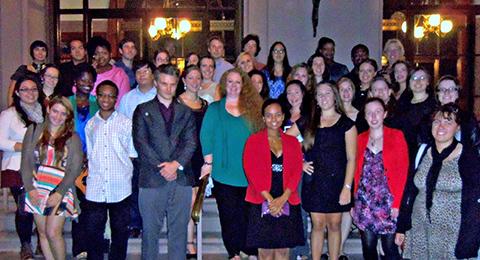Taking Music Education to the Opera

By JEN RETTER ’16
Arcadia University students had the opportunity to see La Bohème, a four-act opera by Giacomo Puccini, at the Academy of Music on Sept. 26. The production marked the start of the opera season, and those who attended had the honor of being the first audience to experience the talented cast’s performance.
Seated in the acoustically and visually perfected Parquet Circle, the students laughed, clapped and cried as the love story between a poet, Rodolfo, and his ill neighbor, Mimi, unfolded. “Operas depict real life and pertain to the soul of man. It gives us a window to look at ourselves through art,” said Professor Valerie Levicoff, who organized the trip with the Opera Company of Philadelphia.
The classes that attended the performance included Levicoff’s University Seminar “Fusion Forms in the Performing Arts” and students from a few of the other courses she teaches, including “Intro to Reading and Writing Music.” They were joined by Professor Elizabeth Murphy’s “Survey of Opera,” “Group Voice” and “Performance Study” classes.
Although there were several different approaches to preparation, Levicoff’s goal was to include lessons pertaining to the opera in each of her classes. Students taking the “Fusion” seminar, which Levicoff teaches alongside Professor Celeste Walker, acted scenes from La Bohème in class. The pair emphasized what Levicoff describes as “ears on learning.” During this process, Walker covered the dramatic portions from an actor’s standpoint, while Levicoff discussed the musical aspect.
Meanwhile, Levicoff’s other classes split into groups and studied each act individually. Her “Intro to Reading and Writing Music” students were shown the piano score to help them to understand what it means to take an opera from paper to the stage. Sophomore Akilah Pierre, a violinist who studies string performance with Levicoff, read the booklet for La Bohème and attended other operas with her peers. “Music [in an opera] is very important for background,” said Pierre. “We became inspired to play, and we’ve learned the importance of an orchestra.”
Murphy’s students had been researching and studying for La Bohème as well. “In ‘Survey of Opera,’ we are learning about the history of opera from its inception to present day, which of course includes Puccini and his contributions to Verismo opera. My group and private students are singing Italian art songs and arias at the moment. In the future, some of them could possibly be on the stage at the OCP,” she explained.
Eventually, each class was able to participate in a teleconference with Craig Verm, the Baritone who portrayed Schaunard in La Bohème. The students had the chance to apply what they had been studying in the classroom to the performer’s experience in the opera. Michelle Mullin, a junior from Levicoff’s “Intro to Reading and Writing” class, said, “I liked [the teleconference] a lot; it was really nice to hear Verm ahead of time.”
The students who took advantage of their opportunity to experience the production praised taking music education outside of the classroom. “I think getting off campus is a great way to apply what we’ve learned in class to the real world,” Mullin continued.
“Moving outside of the school setting allows you to actually witness what you’ve learned for yourself,” Pierre added.
Levicoff also believes that live art is pertinent for students because the experience allows them to broaden their understanding of themselves. “It’s sad that the perception of opera is so far removed. Music used to be the core of education because it encompasses all other subjects. Students can’t be exempt from the arts,” she said.
The goal of an opera is to make an impact that will remain with the audience long after the curtain closes—La Bohème was no exception. Emphasizing the fact that live performances help to shape her students’ lives, Levicoff said, “Music education is not simply about listening and playing, but helping musicians to become who they are as well.”


